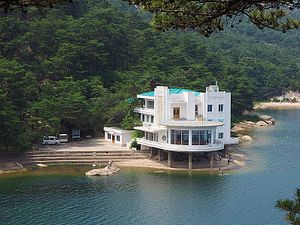North Korea has rejected an offer from South Korea to hold talks to discuss how to handle joint tourism facilities in Mount Kumgang that leader Kim Jong Un recently ordered dismantled.
Kim said last week he wanted the “shabby” and “capitalist” facilities at Mount Kumgang resort removed and rebuilt.
Accordingly, South Korea’s Ministry of Unification had proposed talks with the North. But Pyongyang rejected that idea, saying that they would only discuss the matter by exchanging documents.
The facilities mentioned by Kim were mainly investments made by South Korean firms, including Hyundai Asan, when Mount Kumgang opened to tourists from the South in 1998.
The program was suspended in 2008 after a North Korean soldier shot dead a South Korean tourist who had wandered unknowingly into a military area.
It is not 100 percent unclear what Pyongyang hopes to gain out of the demolition push, but many believe it is another attempt to attract foreign money to tackle sagging economy amid continuing international sanctions.
If North Korea wants to develop and promote Mount Kumgang without South Korean help, how will it go about achieving this? A website of its official tourism agency gives out a hint.
About a week after Kim made his remarks about Mount Kumgang, the official tourism agency for the mountain, Tour-Kumgangsan, claimed that the mountain is suitable for ecotourism.
The website said relevant laws had been already set up to back ecotourism in the tourism zone around the mountain. It added that the zone is equipped with the necessary institutions to promote ecotourism.
In a lengthy report published on October 30, the agency explained why promoting ecotourism is important. Ecotourism “helps tourists experience the ecosystem and contribute to the protection of the ecological environment,” the agency said. “Unlike ordinary tourism that has become popular, ecotourism is a form of tourism that protects the environment and pursues continuous development.”
It added that the purpose of the ecotourism is to maintain tourism resources continuously, protect biodiversity and the ecological environment of tourist sites, and help develop the local economy of the areas around the tourist zone.
Ahn Jeong-shik, a journalist at South Korean broadcaster SBS, is skeptical about North Korea’s ambition.
Ahn, who specializes in the North Korean matters for SBS, said Pyongyang must look at Mount Kumgang objectively to see if it is attractive enough to appeal to foreign tourists.
When North Korea first opened Mount Kumgang to the public by joining hands with Hyundai Asan, it attracted 1.93 million people, according to Ahn.
In fact, however, there were only 12,000 foreigners out of 1.93 million tourists. Moreover, most of these foreigners already lived in South Korea, meaning they did not make a special trip to the peninsula just to tour Mount Kumgang.
“This simply indicates that Mount Kumgang is not the first place where foreigners would like to visit. Without South Koreans, it is difficult for the tour to stay profitable,” Ahn noted.
He also pointed out that foreigners other than Chinese have to take some risks to visit North Korea, because there is always the risk of being detained on North Korean soil.
Ahn wondered how many foreigners are willing to go sightseeing in North Korea while taking such a risk.
Ahn explained that if North Korea really wants to reinvigorate Mount Kumgang tours, it should create an environment in which the tourism project can work by actively engaging in denuclearization negotiations to earn sanctions relief and create a space for South Korea to resume its business.

































